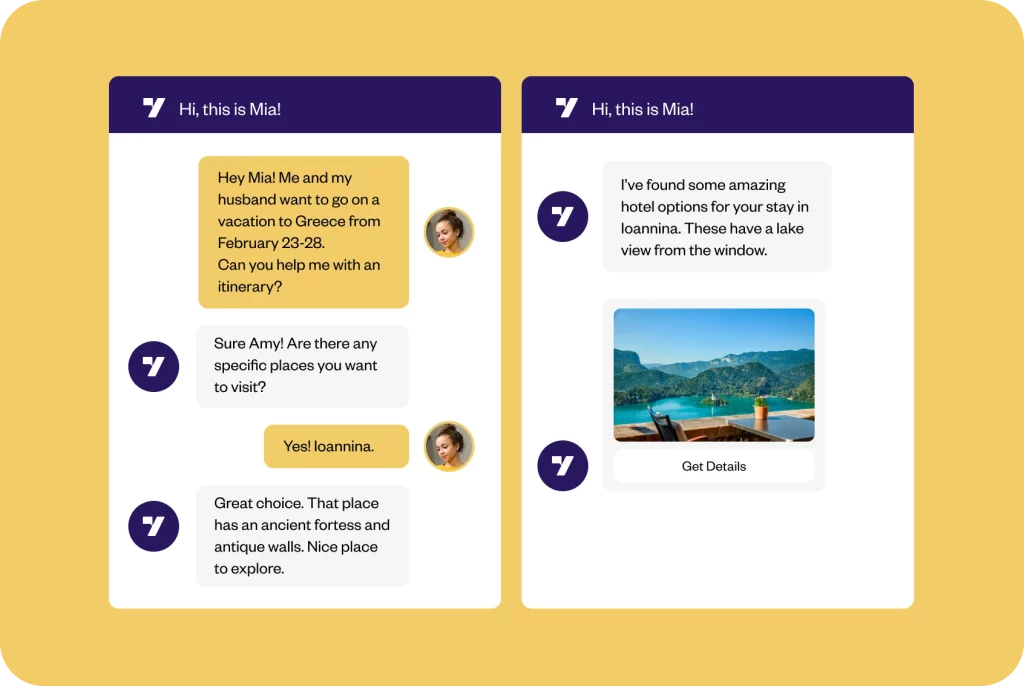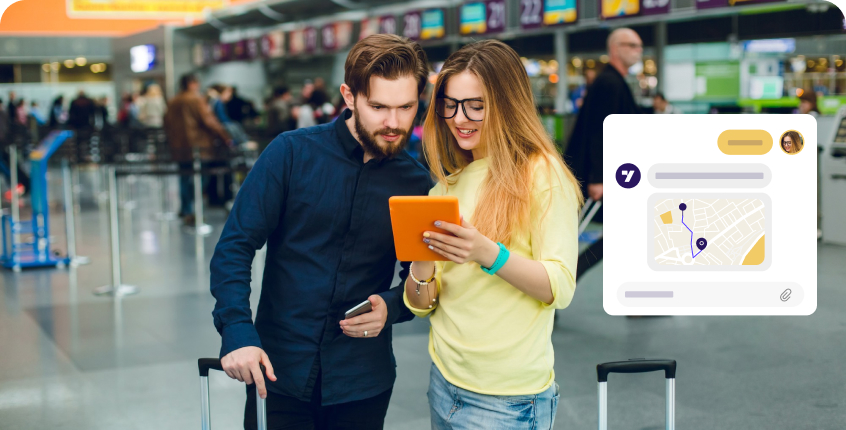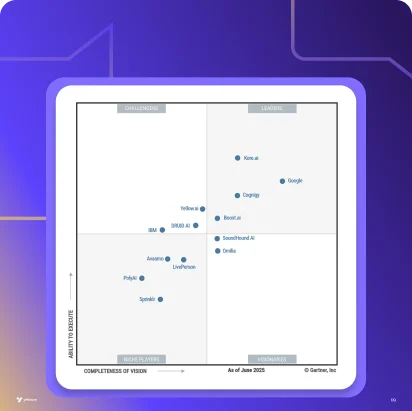In a rush and need the TL/DR version?
Summarize
Travel chatbots are transforming the travel industry by enhancing customer experiences and streamlining operations. This blog explores the significant impact of travel AI chatbots, highlighting their role in providing 24/7 support, real-time updates, and personalized travel solutions.
Key benefits to implementing effective travel chatbots
- Empowers with technology: Integrate advanced AI chatbots to offer real-time assistance, from booking flights to finding hotels, ensuring a seamless travel experience.
- Enhances customer support: Utilize chatbots to provide 24/7 customer support, handling inquiries and issues efficiently across different time zones.
- Increases booking efficiency: Implement chatbots to streamline the booking process, offering quick and relevant travel options based on customer preferences.
- Offers multi-lingual support: Ensure chatbots can converse in multiple languages to cater to a diverse, global customer base.
- Handles high volumes of inquiries: Deploy chatbots to manage increased query volumes during peak travel seasons, maintaining customer satisfaction.
- Automates repetitive tasks: Chatbots can automate routine tasks like booking confirmations and itinerary updates, freeing up human staff for complex issues.
- Utilizes data for personalization: Leverage data collected from chatbot interactions to provide personalized travel recommendations and improve customer loyalty.
- Provide real-time updates: Ensure chatbots offer up-to-the-minute travel information, such as flight delays and gate changes, to keep travelers informed.
Travel businesses can enhance efficiency, reduce operational costs, and improve customer satisfaction using travel chatbots, especially those powered by platforms like Yellow.ai. These bots are essential for delivering exceptional travel experiences in today’s digital landscape.
Note: This summary is not a substitute for reading the article in full, as you may miss out on important nuances.
The travel industry is experiencing a digital renaissance, and at the heart of this transformation are travel chatbots. This insightful article explores the burgeoning world of travel AI chatbots, showcasing their pivotal role in enhancing customer experiences and streamlining operations for travel agencies. We’ll explore real-world applications and benefits, from 24/7 customer support to real-time travel updates, and highlight how these innovative chatbots are not just answering questions but also proactively solving complex travel challenges.
Gone are the days when planning a trip involved endless calls and cumbersome bookings. Today, the travel landscape is being revolutionized by a silent yet powerful digital force: travel chatbots. Speed and personalization are king in today’s travel world, and these AI-powered assistants are quietly changing the rules of the game, making them indispensable tools for travelers and travel agencies alike.
Imagine a tool that’s available 24/7, understands your preferences, speaks your language, and guides you through every step of your travel journey. From the bustling streets of New York to the serene landscapes of Kyoto, these chatbots are your travel wizards, making every trip not just a journey but an experience to cherish.
Related must-reads:
- Customer service chatbots: Benefits and examples [2023]
- How to create a chatbot – Best practices to follow in 2023
- 30 Chatbot applications from six key industries
- Enterprise Chatbot – A Guide for Enterprises [2023]
- Benefits of AI Chatbots for Businesses and Customers
Recent industry analyses, including a NASDAQ-highlighted study, underscore a vast potential for enhanced customer service in travel and hospitality. Amidst this backdrop, travel chatbots emerge as trailblazers, creating seamless, stress-free experiences for travelers worldwide. Whether it’s efficiently managing bookings or offering real-time updates, these chatbots are proving to be more than just virtual assistants; they are becoming the architects of enriched travel experiences in a post-pandemic world.
What are travel chatbots?
Travel chatbots are the new navigators of the tourism world, offering a seamless blend of technology and personal touch. Think of them as your digital travel agents, available 24/7, ready to assist with anything from booking flights to finding the perfect hotel. They’re not just programmed for responses; they’re designed to understand and adapt to your travel style.
These chatbots are all about making travel simpler and more enjoyable. Whether it’s on a website, a mobile app, or your favorite messaging platform, they’re the go-to for quick, efficient planning and problem-solving. They’re particularly adept at handling the complexities of travel arrangements, providing real-time support, and personalizing your journey based on your preferences.
A key point to note: Travelers are embracing this change. Studies show a growing number of travelers, nearly 37%, prefer consulting a chatbot for comparing travel options and making plans. It’s a reflection of the digital era we’re in, where convenience and efficiency are valued.
In essence, travel chatbots are redefining the travel experience. They have gone beyond just facilitating bookings to enhance the entire journey, making every trip smoother, more personalized, and enjoyable.
Benefits of chatbots for the travel industry
Chatbots have emerged as indispensable threads, weaving together technology and human touch to enhance the traveler’s journey. Here’s how they’re making a difference:
- 24/7 customer support
- Quick response time
- Increased booking efficiency
- Ease of use chatbot for customers
- Multi-lingual Support Chatbot
- Handling high volumes of inquiries
- Cost Reduction through Chatbot Automation
- Automation of repetitive tasks
- Data collection and personalization
- Sales and marketing opportunities
- Reduced error margin
- Real-time travel updates
1. 24/7 customer support
Travel doesn’t adhere to a 9-to-5 schedule, and neither do chatbots. Whether it’s a late-night query about a hotel in Rome or an early-morning flight change, these virtual assistants are always on, ensuring no customer is left without support, irrespective of time zones or geography.
2. Quick response time
The digital world waits for no one, and delays can cost bookings. Chatbots provide instant responses to customer inquiries, reducing the time from initial questions to booking confirmations. This speed enhances the customer experience and increases the likelihood of securing bookings, as prompt replies often translate to satisfied clients.
3. Increased booking efficiency
Efficiency is vital in travel planning. Chatbots streamline the booking process by quickly filtering through options and presenting the most relevant choices to customers. It speeds up decision-making and also improves the accuracy and relevance of the bookings made, thereby increasing customer satisfaction and repeat business.
4. Ease of use chatbot for customers
User-friendliness is crucial in online interactions. Chatbots offer an intuitive, conversational interface that simplifies the booking process, making it as easy as chatting with a friend. This ease of use enhances the customer experience, making them more likely to return to your platform for future travel needs.
5. Multi-lingual Support Chatbot
In a global industry like travel, language barriers can be significant obstacles. Chatbots bridge this gap by conversing in multiple languages, enabling your business to cater to a broader, more diverse customer base. This capability enhances customer service and also opens up new markets for your business.
6. Handling high volumes of inquiries
During peak travel seasons or promotional periods, the influx of inquiries can overwhelm customer service teams. Chatbots effortlessly manage these increased volumes, ensuring every query is addressed and potential bookings are not lost due to capacity constraints.
7. Cost Reduction through Chatbot Automation
Implementing chatbots can significantly reduce operational costs. By automating routine tasks and inquiries, chatbots free up human staff to focus on more complex and revenue-generating activities. Thus, you can optimize your workforce, and the need for a large customer service team can be reduced.
8. Automation of repetitive tasks
Chatbots excel in handling repetitive tasks such as issuing booking confirmations, sending reminders, and providing itinerary updates. This automation ensures accuracy and consistency in these routine communications, allowing your staff to dedicate more time to personalized customer service and complex problem-solving.
9. Data collection and personalization
Every interaction with a chatbot is an opportunity to gather valuable customer data. Businesses can analyze this data to understand customer preferences and behaviors, enabling them to offer more personalized and targeted travel recommendations. Thus, chatbots can enhance the overall customer experience and loyalty.
10. Sales and marketing opportunities
Chatbots are effective tools for upselling and cross-selling. By analyzing customer preferences and past behaviors, chatbots can make timely suggestions for additional services or upgrades, enhancing the customer’s travel experience while increasing your business’s revenue.
11. Reduced error margin
The automated nature of chatbots minimizes human error in bookings and customer interactions. This precision enhances the reliability of your service, leading to greater customer trust and fewer resources spent on correcting mistakes.
12. Real-time travel updates
Staying informed is crucial in travel. Chatbots provide travelers with up-to-the-minute updates on flight statuses, gate changes, or even local events at their destination. This real-time information ensures travelers are well-informed and can make timely decisions, improving their overall travel experience.
By leveraging these benefits, travel businesses can enhance efficiency, customer satisfaction, and profitability. Chatbots, especially those powered by sophisticated platforms like Yellow.ai, are not just tools; they are partners in delivering exceptional travel experiences.
Top 5 use cases of travel chatbots
Travel chatbots are like having an experienced travel advisor, a problem solver, and a personal assistant all rolled into one. Here’s a closer look at how they’re transforming the travel industry:
Related read: Top 10 chatbot use cases across different industries
Use case #1. Flight and hotel bookings

Picture a chatbot as your personal travel shopper. When a customer plans a trip, the chatbot acts as a guide through the maze of flight options and hotel choices. For instance, a couple looking to book a romantic getaway to Fiji can simply tell the chatbot their dates and preferences. The chatbot then sifts through hundreds of flights and accommodations, presenting the couple with options that match their romantic theme, budget, and desired amenities – all in a matter of seconds.
This level of personalization and efficiency isn’t just convenient; it’s changing the way people approach travel planning, making it a less challenging and more enjoyable experience.
Use case #2. Real-time travel updates
The dynamic nature of travel means plans can change at a moment’s notice. Here, chatbots become an invaluable source of up-to-date information. Imagine a family at the airport, their flight suddenly delayed. The travel chatbot immediately notifies them, providing alternative flight options and even suggesting airport lounges where they can relax while they wait. This proactive approach turns potential travel hassles into minor, manageable blips in their journey.
Use case #3. Personalized travel suggestions
Travel chatbots excel in tailoring suggestions to each traveler’s unique interests. Let’s say a solo traveler is exploring Japan for the first time. The chatbot, knowing their interest in historical sites and local cuisine, suggests a visit to Kyoto’s ancient temples followed by a dining experience at a renowned sushi restaurant. These personalized recommendations make each trip uniquely satisfying and memorable.
Use case #4. Customer support
The real value of chatbots shines through in customer support. Consider a traveler who loses their luggage. The chatbot becomes their first point of contact, guiding them through the process of locating and retrieving their luggage and even offering compensation options like discounts on future bookings. This level of immediate and empathetic response can transform a stressful situation into a testament to your travel business’s commitment to customer care.
Use case #5. Post-trip interaction
The journey with a chatbot doesn’t end when the trip does. After travelers return home, the chatbot reaches out for feedback. It’s like having a thoughtful conversation with a friend who cares about how your trip went. Did you enjoy the hotel? Were the flight arrangements convenient? Based on the responses, the chatbot can suggest future destinations or travel tips, keeping the traveler engaged and excited about their next adventure.
Best travel chatbot examples from Yellow.ai
1. Pelago’s journey with generative AI-powered travel assistant
Pelago, a venture by the Singapore Airlines Group, faced the challenge of managing high-volume travel queries efficiently. With the goal of streamlining the booking process and minimizing human involvement, they turned to Yellow.ai.
The solution was a generative AI-powered travel assistant capable of conducting goal-based conversations. This innovative approach enabled Pelago’s chatbots to adjust conversations, offering personalized travel planning experiences dynamically. From handling specific requests like “Cancel my booking” to more open-ended queries like planning a family trip to Bali, these chatbots brought a near-human touch to digital interactions. The integration of Yellow.ai with Zendesk further enhanced agent productivity, allowing for more personalized customer interactions.
The result? A 50% deflection rate in product inquiries and over 5,000 users onboarded within just six weeks.
2. Indigo’s elevating customer satisfaction with AI automation
Indigo sought to enhance its customer support operations, aiming to efficiently handle high query volumes around the clock while managing costs. They found their solution in Yellow.ai’s dynamic AI agent, Dottie.
Dottie, operational on WhatsApp and the website, automated over 35 use cases, including booking tickets and managing loyalty programs. Powered by Yellow.ai’s DynamicNLPTM engine, Dottie achieved an impressive 1.69% unidentified utterance rate and a 90% user acceptance rate. The AI agent’s ability to seamlessly switch channels while retaining historical context significantly improved the customer experience.
Coupled with outbound awareness campaigns, Dottie played a pivotal role in achieving an average customer satisfaction score of 87%.
3. Bengaluru Metro’s AI-powered commuter revolution
The Bengaluru Metro Rail Corporation Limited (BMRCL) aimed to reduce wait times for its 380K+ daily commuters. To this end, it introduced an industry-first QR ticketing service powered by Yellow.ai’s Dynamic AI agent.
The Bengaluru Metro Bot, available on WhatsApp, allows commuters to easily book tickets, check train schedules, and recharge their metro cards. The bot’s QR ticketing service provides a seamless payment experience right from the WhatsApp interface.
This innovative approach led to significant improvements in commuter satisfaction, handling over 15 million messages and processing thousands of travel card recharges.
4. Tiket.com’s customer experience transformation with Travis
Faced with the challenge of addressing over 40,000 daily travel queries, Tiket.com sought to enhance operational efficiency and customer satisfaction. They adopted Yellow.ai’s dynamic AI agent, Travis, to transform their customer experience.
Travis offered on-demand personalized service at scale, automating 70-80% of routine queries in multiple languages. This shift not only improved customer satisfaction but also allowed human agents to focus more empathetically on complex issues.
The deployment of Travis led to an 80% CSAT score and the resolution of 80% of monthly queries without human assistance, showcasing the power of AI in revolutionizing customer support in the travel industry.
How to build a travel chatbot using Yellow.ai?
Yellow.ai stands as a beacon of innovation in the travel chatbot landscape. Building a travel chatbot with Yellow.ai is not just about automation; it’s about crafting a digital travel companion that resonates with your brand’s unique voice and customer needs.
Yellow.ai’s platform offers features like DynamicNLPTM for multilingual support, ensuring your chatbot can communicate effectively with a global audience. The no-code builder and pre-built templates make it easy for any travel business, regardless of size or technical expertise, to create a chatbot tailored to their specific needs. With the ability to handle complex queries, provide real-time updates, and personalize interactions, Yellow.ai’s chatbots elevate the customer experience to new heights.
Interested in exploring how Yellow.ai can transform your travel business? Book a demo today and embark on a journey towards digital excellence in customer engagement.
The final word on travel chatbot
Travel chatbots have become pivotal in redefining the travel experience. They blend advanced technology with a touch of personalization to create seamless, efficient, and enjoyable travel journeys. As the travel industry continues to evolve, the integration of AI-powered chatbots will undoubtedly play a central role in shaping its future, making every trip not just a journey but a memorable experience.
Travel chatbot – Frequently asked questions (FAQs)
What is a travel chatbot?
A travel chatbot is a digital assistant powered by artificial intelligence. It is designed to help travelers with various aspects of their journey, from booking flights and hotels to providing real-time travel updates and personalized recommendations.
How do travel AI chatbots work?
Travel AI chatbots work by using artificial intelligence, particularly machine learning and natural language processing, to understand and respond to user inquiries. They analyze data from interactions to improve their responses and offer more personalized assistance.
How can a travel chatbot improve the customer experience?
A travel chatbot enhances customer experience by providing instant, 24/7 support, personalized travel suggestions, and efficient handling of bookings and inquiries, making the travel planning process more convenient and enjoyable.
How can a travel chatbot help in managing bookings?
Travel chatbots streamline the booking process by quickly sifting through options based on user preferences, offering relevant choices, and handling booking transactions, thus increasing efficiency and accuracy.
Can a travel chatbot handle customer complaints and queries?
Yes, a travel chatbot can effectively manage customer complaints and queries by providing timely responses, resolving common issues, and escalating complex situations to human agents when necessary.
What is an example of a tourism chatbot?
An example of a tourism chatbot is a virtual assistant on a city tourism website that helps visitors plan their itinerary by suggesting local attractions, restaurants, and events based on their interests.
What are the common functions of a travel chatbot?
Common functions of a travel chatbot include handling flight and hotel bookings, providing real-time travel updates, offering personalized travel recommendations, and supporting customers with their inquiries and complaints.
What are the advantages of chatbots in tourism?
The advantages of chatbots in tourism include enhanced customer service, operational efficiency, cost reduction, 24/7 availability, multilingual support, and the ability to handle high volumes of inquiries.
What is an example of an airline chatbot?
An example of an airline chatbot is an AI-powered assistant on an airline’s website or app that helps passengers check flight statuses, book tickets, receive boarding information, and access customer support.























